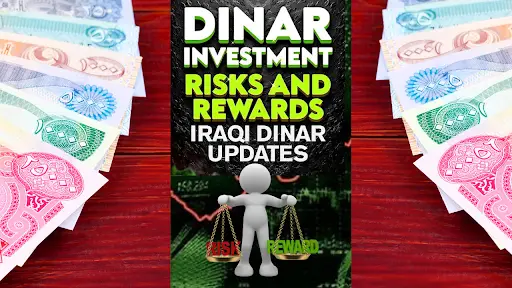Why Do People Still Talk About Iraqi Dinar?
Every few months, the buzz returns: Could the Iraqi dinar be the next big currency to explode in value?
For many, this conversation is nothing new—it’s been going on for years. But despite all the debate, investors are still paying attention. Why?
Because Iraq remains a country with untapped economic potential, especially with its massive oil wealth. But like any investment opportunity with high potential returns, there are just as many risks to consider.
So what does the landscape look like in 2025?
Let’s break it all down with an open mind.
Potential Gains: Hype vs. Reality
- The Revaluation Rumor Mill: Speculation about a possible revaluation (RV) of the Iraqi dinar has persisted for over a decade. At the heart of this is Iraq’s proven oil reserves—fifth-largest in the world—and the idea that once the economy stabilizes, the dinar could shoot up in value. In theory, it’s not an entirely baseless belief. A strong resource-backed economy can certainly support a stable and possibly appreciating currency.
- The Current State of the Dinar: As of 2025, the Iraqi dinar remains pegged to the U.S. dollar at approximately 1,309 IQD per USD. The Central Bank of Iraq (CBI) uses this fixed exchange rate to maintain inflation control and price stability. While this system avoids volatility, it also means that the dinar does not rise and fall with market forces the way freely traded currencies do. In other words, a dramatic overnight jump in value is extremely unlikely unless Iraq undergoes a substantial economic transformation.
Liquidity Challenges in the Dinar Market
- Hard to Buy, Even Harder to Sell: Investing in the dinar isn’t like buying euros or yen. The IQD is not widely available on international forex platforms. Most dinar purchases happen through niche dealers or online brokers who add hefty markups, sometimes 20% or more. These fees mean investors need a significant increase in the dinar’s value just to break even.
- Reselling Realities: On the flip side, selling dinars can be even more difficult. Many investors discover that buyers are scarce, and offers are far below the original purchase price. This lack of liquidity poses a big issue for anyone hoping to “flip” their holdings quickly or without a loss.
Geopolitical Risks Investors Shouldn’t Ignore
- Unrest, Corruption, and Regional Tensions: Iraq has made strides toward political and economic reform, but the country still faces ongoing challenges. Political instability, bureaucratic inefficiency, and corruption remain major issues. Internal conflict or friction with neighboring countries can create economic shockwaves, instantly weakening investor confidence.
- Oil Dependency: Yes, oil is Iraq’s economic backbone—but that’s also a risk. Any dip in global oil prices directly affects Iraq’s budget and currency stability. While diversification efforts are in motion, the economy still leans heavily on this one sector.
Who’s Profiting Most from the Iraqi Dinar Craze?
- The Dealer’s Advantage: While investors hope for gains, many of the immediate profits in the dinar market are made by currency dealers. These businesses often buy at central bank rates and sell at significant premiums, especially to retail investors. In the event of a true revaluation, those who bought in bulk at lower rates may see profit, but only if they can liquidate quickly and at fair rates.
- Beware of Unrealistic Promises: There are also players in the market who capitalize on misinformation, pushing exaggerated claims of a massive RV “any day now.” These scams often target uninformed or desperate investors with promises of overnight wealth. Multiple warnings have been issued by financial regulators over the years about such tactics.
Can the CBI Stabilize Returns?
What is the Central Bank doing?
The Central Bank of Iraq plays a careful game. Their primary goals include maintaining monetary stability, controlling inflation, and gradually integrating Iraq into the global economy. The CBI has introduced initiatives like gold reserve accumulation, banking sector reforms, and even exploring a digital dinar.
Will There Be a Revaluation?
There is no formal policy or timeline announced for a revaluation. What’s more likely is a slow, step-by-step strengthening of the dinar—if reforms succeed, oil revenues stabilize, and political order holds. Any appreciation would be incremental, not sudden.
The Redenomination Angle
Sometimes mistaken for revaluation, redenomination is a government-led action to change the face value of a currency, often by removing zeros. The CBI has previously discussed this possibility as a way to simplify transactions, not to increase real purchasing power.
Could It Affect Investors?
Yes, if not handled properly. Redenomination can be neutral if executed with clarity, but if investors misunderstand the process or if communication is poor, it can lead to confusion, panic selling, or even losses.
Is There a Path to Profit?
- Slow and Strategic Reform: If Iraq continues its current reform efforts—fighting corruption, enhancing security, digitalizing its economy, and diversifying beyond oil—there may be a path toward currency appreciation. But it’s going to take time, coordination, and transparency.
- A Patient Investor’s Market: The dinar is not a short-term trading play. Investors who understand the long game, accept the risks, and manage their expectations may be in a better position to benefit, if and when the fundamentals shift in Iraq’s favor.
Key Takeaways:
The Iraqi dinar investment scene is filled with contrasting narratives—some overly optimistic, others unfairly dismissive. The truth lies somewhere in the middle. Iraq has genuine economic potential, but realizing it requires overcoming deep-rooted challenges.
The key for investors is to separate facts from fantasy. The dinar isn’t a guaranteed windfall, but it’s also not without merit. If approached strategically—with awareness of liquidity issues, geopolitical dynamics, and economic reforms—it can be a calculated part of a diverse investment portfolio.
Don’t expect fireworks. Expect a slow burn, and decide whether that’s a journey you’re willing to join with patience and insight.

 Admin Admin
Admin Admin
